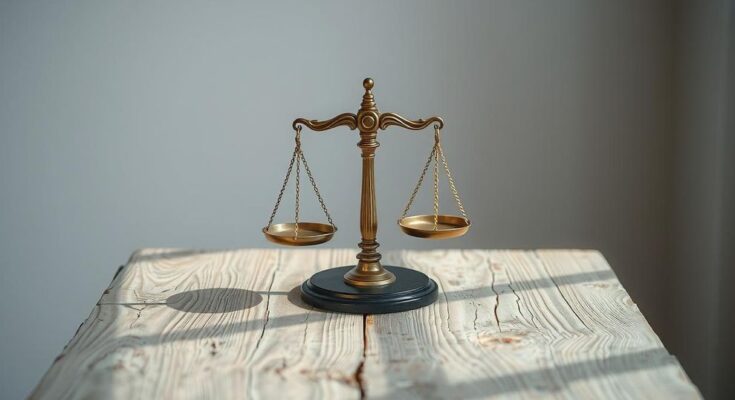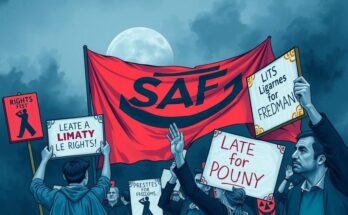Crushing Dissent in Algeria
The situation in Algeria remains dire as authorities tighten their grip on dissent, stifling freedoms such as expression, assembly, and the press. President Abdelmadjid Tebboune’s re-election, achieved with an overwhelming 84.3% of votes in September, occurred amidst widespread repression, with no space for genuine political discourse. Activists and journalists continue to face legal repercussions for simply voicing their opinions.
Continued Repression of Freedom
The persistent crackdown on freedom of expression has led to the detention of numerous activists and media figures. Prominent cases include activist Mohamed Tadjadit, who faced multiple arrests since 2019, and artist Djamila Bentouis, convicted for a song depicting government oppression. Such actions exemplify the government’s strategy to silence dissent at all costs.
Media Under Siege
The media landscape in Algeria has deteriorated, with a 2024 ranking of 139th out of 180 in press freedom. Journalists like Fouzia Amrani received harsh sentences for trivial offenses, demonstrating the regime’s hostility towards those who dare to report critically. Additionally, the closing of independent media outlets underscores the chilling effect on free journalism.
Restrictions on Assembly
Organized gatherings face relentless suppression, as seen when security forces intervened to prevent multiple human rights events in Algiers. The authorities’ aggressive approach extends to arbitrary arrests during public demonstrations, stifling the rights of citizens to associate peacefully. The patently insecure atmosphere fosters an environment of fear among activists.
Arbitrary Travel Bans
The imposition of travel bans has surged, effectively curtailing the freedom of movement for dissenters. Journalists and activists, often barred from leaving the country, find themselves trapped in a network of intimidation. Notable cases include journalist Mustapha Bendjama, kept from traveling abroad due to politically motivated allegations.
Legal and Constitutional Gaps
Recent amendments to Algeria’s penal code have introduced vague definitions criminalizing acts that challenge state authority, further broadening the government’s control. The arbitrary use of counter-terrorism laws against dissenters creates an atmosphere of distrust and suppresses activism under the guise of security.
Migrants’ Rights Violations
Algeria’s crackdown extends beyond its citizens, with authorities committing human rights abuses against migrants. Reports indicate that approximately 20,000 individuals were expelled to perilous conditions, often without due process, raising serious concerns about humanitarian standards in the region.
Summary
The ongoing situation in Algeria highlights a stark deterioration in human rights, with a systematic crackdown on freedom of expression, assembly, and the media. The government’s oppressive tactics, including arbitrary detentions and travel bans, have created a climate of fear and repression, extending even to the treatment of migrants.
Conclusion
In summary, Algeria faces an alarming deterioration in civil liberties, with the government entrenched in repressive tactics. The muzzling of dissent, combined with the harsh treatment of journalists, activists, and migrants, paints a grim picture of a nation struggling under authoritarian rule. The plea for respect for human rights remains unheeded, leaving many in a perilous state.
Key Highlights
– Over 84% of votes re-elected President Tebboune amid repression.
– Activists face increasing detention for peaceful dissent.
– Algeria ranks 139th in press freedom; government closes independent media.
– Arbitrary travel bans introduced, affecting dissenters.
– Nearly 20,000 migrants expelled under harsh conditions.
Quotes
“The government is increasingly using repressive laws against dissent.” – Human Rights Defender Zakaria Hannache
Proof to Links
No links provided in the original content.
Title
Rights Trends in Algeria: A Landscape of Repression and Fear
– President Tebboune re-elected amid repression. – Continued arrests of activists and journalists. – Algeria ranks low in press freedom at 139th. – Arbitrary travel bans hinder dissenters. – Significant abuses against migrants reported.
Algeria’s human rights landscape is marked by a concerning escalation of repression against dissenting voices. From the crackdown on freedom of expression to arbitrary travel bans and the harsh treatment of migrants, the government demonstrates a relentless pursuit of control. The future of civil liberties in Algeria depends on a shift towards respecting fundamental human rights.
Original Source: www.hrw.org



